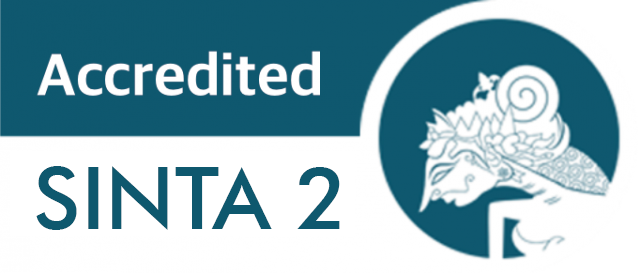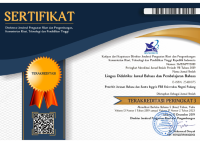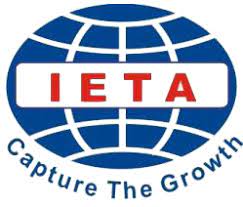Between Tradition and Hierarchy: Language Policy in Preserving Linguistic Uniqueness in East Java Islamic Boarding Schools
 ), Zuliati Rohmah(2),
), Zuliati Rohmah(2), (1) Master's Programme in Linguistics Department of Language and Literature Universitas Brawijaya
(2) English Language Education, Department of Language Education Universitas Brawijaya
 Corresponding Author
Corresponding Author
Copyright (c) 2025 Lingua Didaktika: Jurnal Bahasa dan Pembelajaran Bahasa
DOI : https://doi.org/10.24036/ld.v19i1.129315
Full Text:
 Language : en;ind;jav
Language : en;ind;jav
Abstract
This study explores the implementation of a language policy at the Al Islahiyyah Islamic Boarding School, which emphasizes the use of the Javanese language (Krama) across various levels. The policy aligns with traditional cultural practices, dividing the language into three levels: Krama Inggil, Krama Alus, and Ngoko Alus, each reflecting different degrees of respect and social hierarchy. The methodology involved qualitative analysis through observations and interviews with students and teachers to assess the application and challenges of this policy. Results indicate that the policy successfully preserves cultural heritage and fosters respect and politeness among students. However, it also presents challenges due to the diverse linguistic backgrounds of the students, many of whom are not familiar with proper Javanese usage at home. The study concludes that while the language policy contributes positively to cultural identity and linguistic proficiency, it requires significant adaptation efforts. Furthermore, the research suggests the need for future studies to examine the long-term effects of the policy on students' proficiency in other languages and its broader implications in a multilingual context. Future research should also investigate the integration of other languages into the curriculum and track the students' linguistic and cultural adaptability post-graduation to provide a comprehensive understanding of the policy's impact.
Keywords
References
Abdurrachim, R. F. H. (2015). Building harmony and peace through religious education; social prejudice and rebeliance behavior of students in modern islamic boarding school gontor darussalam, east java. Turãst: Jurnal Penelitian & Pengabdian, 3(1).
Anggraini, N. D. (2017). Stigmatisasi penggunaan nama sapaan di kalangan santri Pondok Pesantren Kiai
Ageng Selo Dukuh Selogringging, Desa Tulung, Kecamatan Tulung, Kabupaten Klaten [Thesis].
Antari, L. P. S. (2019). Bahasa Indonesia sebagai identitas nasional Indonesia. Stilistika, 8(1). https://doi.org/10.5281/zenodo.3903959
Ardhiarta, A. (2013). Kesantunan berbahasa dalam interaksi sosial di Pondok Pesantren Darul Ulum Jombang: Suatu kajian pragmatik. Skriptorium, 2(1).
Aulia Normalita, & Wahyu Oktavia. (2019). Komunikasi multilingual pada komunitas santri Pondok Pesantren Mahasiswa Darussalam di Kartasura. Imajeri, 2(1), 24–31. https://doi.org/10.22236/imajeri.v2i1.5074
Bamgbose, A. (1991). Language and the nation: The language question in Sub-Saharan Africa.
Edinburgh: University of Edinburgh Press
Firdausiyah, H. (2019). A linguistic landscape study in Pondok Pesantren Putri Mambaus Sholihin Gresik [Thesis]. diglib.uinsa.ac.id
Hartono, R. (2016). Pola komunikasi di pesantren : Studi tentang model komunikasi antara kiai, ustadz, dan santri di pondok pesantren TMI al-amien prenduan. Al-Balagh: Jurnal Dakwah Dan Komunikasi, 1(1), 67. https://doi.org/10.22515/balagh.v1i1.60
Hilgendorf, E. (2003). Islamic education: History and tendency. Peabody Journal of Education, 78(2), 63–75. https://doi.org/10.1207/s15327930pje7802_04
Ibrahim, R. (2014). Eksistensi pesantren salaf di tengah arus pendidikan modern . https://media.neliti.com/media/publications/41935-ID-eksistensi-pesantren-salaf-di-tengah-arus-pendidikan-modern.pdf
Karnaen, A. (2013). The policy of moral education on KH Imam Zarkasyi’s thought at Gontor Modern Islamic Boarding School. Jurnal Pendidikan Islam, 3(1), 163. https://doi.org/10.14421/jpi.2014.31.163-182
Kurniasih, D., & Zuhriyah, S. A. (2017). Alih kode dan campur kode di Pondok Pesantren Mahasiswa
Darussalam. Indonesian Language Education and Literature, 3(1), 53. https://doi.org/10.24235/ileal.v3i1.1521
Maskur A., & Anto, P. (2018). Metode pembelajaran bahasa asing arab di pondok pesantren modern. El-Banar: Jurnal Pendidikan Dan Pengajaran, 1(1), 63–68.
Novita, K., & Iswari, R. (2023). Unggah-ungguh dalam etika jawa sebagai pedoman interaksi sosial antara santri dengan kiai Pondok Pesantren Raudlatut Thalibin Kabupaten Rembang.
Nurdin, A. (2016). Tradisi komunikasi di pesantren. Karsa: Jurnal Sosial Dan Budaya Keislaman, 23(2), 276–276. https://doi.org/10.19105/karsa.v23i2.727
Puspitasari, R., & Resmalasari, S. (2022). Peran guru sebagai figur panutan dalam penerapan keterampilan saling berbagi di era disrupsi. PAKIS (Publikasi Berkala Pendidikan Ilmu Sosial), 2(2). https://doi.org/10.20527/pakis.v2i2.6540
Qadariyah, L. (2015). Peran pesantren dalam melestarikan bhesa alos bhesa madhureh (studi pesantren di kabupaten sumenep). Jurnal Pamator, 8(2), 85–94.
Rohmah, Z., Sholihah, D. N., Basthomi, Y., & Milal, A. D. (2024). School-scape as a linguistic battlefield: An LL study at Darussalam education complex of Gontor, Indonesia. Cogent Arts & Humanities, 11(1). https://doi.org/10.1080/23311983.2024.2348301
Sa’adah, I., Asrumi, & Baharudin, A. (2016). Penggunaan kata sapaan pada masyarakat Jawa di Desa Jombang Kecamatan Jombang Kabupaten Jember. Publika Budaya, 1(1), 1–7.
Sakhiyya, Z., & Martin-Anatias, N. (2020). Reviving the language at risk: A social semiotic analysis of the linguistic landscape of three cities in Indonesia. International Journal of Multilingualism, 20(2), 1–18. https://doi.org/10.1080/14790718.2020.1850737
Siti Rahmatia Ntou. (2024). Exploring complex diglossia in Javanese society. Cogent Arts & Humanities, 11(1). https://doi.org/10.1080/23311983.2024.2313286
Sofyan, A., Firmansyah, M. B., Muta’allim, Solissa, E. M., & Rosikh, F. (2022). Islamic boarding school linguistic landscape in the development of arabic language skills and islamic knowledge. International Journal of Educational Research and Social Sciences, 3(6), 2178–2185. https://doi.org/10.51601/ijersc.v3i6.563
Spolsky, B. (2004). Language policy. Cambridge: Cambridge University Press.
Spolsky, B. (2009). Language management. Cambridge, UK: Cambridge University Press.
Susylowati, E. (2021). Pilihan kode dalam interaksi belajar-mengajar di pesantren ( kajian sosiolinguistik). TELAGA BAHASA, 8(1). https://doi.org/10.36843/tb.v8i1.223
Tarmizi, Y. (2023). Membuat catatan lapangan (field note) dalam penelitian kualitatif. https://doi.org/10.13140/RG.2.2.31045.63202
Wulandari , P. N., & Putra, A. H. (2022). Penggunaan ragam kata sapaan di Pondok Pesantren Putri
Walisongo Jombang : Kajian sosiolinguistik. SALIMIYA: Jurnal Studi Ilmu Keagamaan Islam, 3(4).
Yusuf, K. (2022). Language patterns in the linguistc landscape of pesantren. Al-Lughah: Jurnal Bahasa, 11(1), 28. https://doi.org/10.29300/lughah.v11i1.6419
Yusuf, K., Oktaviana, I., Aulia Nisa, N., & Nurjannah, N. (2022). Exploring linguistic landscapes of pesantren: Their patterns and functions. NOTION: Journal of Linguistics, Literature, and Culture, 4(2), 63–75. https://doi.org/10.12928/notion.v4i2.5789
Zakiyah, M. (2018). Makna sapaan di pesantren: Kajian linguistik-antropologis. LEKSEMA: Jurnal Bahasa Dan Sastra, 3(1), 11. https://doi.org/10.22515/ljbs.v3i1.1014
 Article Metrics
Article Metrics
 Abstract Views : 181 times
Abstract Views : 181 times
 PDF Downloaded : 37 times
PDF Downloaded : 37 times
Refbacks
- There are currently no refbacks.
Copyright (c) 2025 Lingua Didaktika: Jurnal Bahasa dan Pembelajaran Bahasa

This work is licensed under a Creative Commons Attribution-NonCommercial 4.0 International License.









